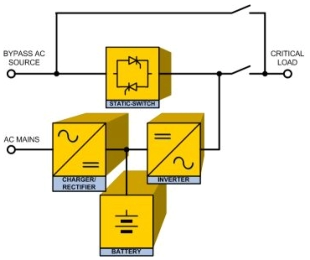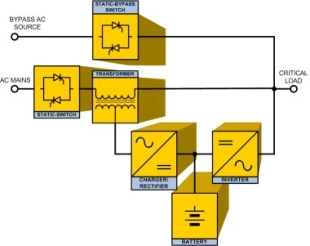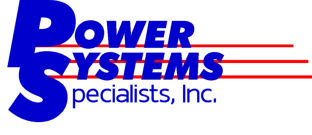

Copyright © Power Systems Specialists, Inc.
Send e-mail to: webmaster@p-s-s.com with questions or comments about site
UPS Topology
Uninterruptible Power Supplies on the market today come in basically two types of designs: Line-interactive and Double conversion. These two typologies operate differently and can impact the critical load if the wrong style is use. Typically a line- interactive UPS is adequate for personnel computing or for applications where isolation on the output is not critical. For most facilities we recommend a double conversion UPS because they have a better output wave form across all operating modes and better isolation. This can be referred to as computer grade power.
Double Conversion
Online double-conversion UPS use a power circuit and an inverter that changes the incoming AC power into DC power through a rectifier and reconverts the power back to regulated AC through an inverter. This double conversion process—AC to DC, DC to AC—provides continuous power to the load for conditioned power. The Double Conversion UPS will provide protection from power outages by batteries connected on the DC bus. Double Conversion UPS units provide protection and complete electrical isolation from all types of power problems: surges, spikes, transients, sags, line noise, frequency variation, brownouts and blackouts. The Double Conversion UPS can handle large voltage input swings and heavy waveform distortion with out going to battery and still be able to provide a clean output wave form to the loads.
Line Interactive
Line-interactive UPS uses a transfer switch and a combination inverter/converter, which both charges the battery and converts its energy to AC for the output during a loss of utility power. AC line power is still the primary power source for loads and is being constantly filtered. The battery is the secondary power source. When the line power is operating, the inverter/converter charges the battery; when the power fails, it operates in reverse and converts the battery power into AC power to feed the loads after the internal transfer switch opens up the mains input. The Line-interactive UPS are normally fitted with circuitry to filter out utility line noise and spikes, and to regulate the voltage output, providing additional power during brownouts and curtailing output during surges. A Line Interactive UPS can not handle as large of voltage input swings or heavy distortion of the input wave forms without going to battery. It is not uncommon for Line Interactive UPS to transfer to battery several times a day. In addition, some Line Interactive UPS units do not have an internal bypass so when the unit has a failure it shuts down and the critical load will be lost.



Call Toll Free (888) 305-1555

UPS Topology
Uninterruptible Power Supplies on the market today come in basically two types of designs: Line- interactive and Double conversion. These two typologies operate differently and can impact the critical load if the wrong style is use. Typically a line- interactive UPS is adequate for personnel computing or for applications where isolation on the output is not critical. For most facilities we recommend a double conversion UPS because they have a better output wave form across all operating modes and better isolation. This can be referred to as computer grade power.
Double Conversion
Online double-conversion UPS use a power circuit and an inverter that changes the incoming AC power into DC power through a rectifier and reconverts the power back to regulated AC through an inverter. This double conversion process—AC to DC, DC to AC—provides continuous power to the load for conditioned power. The Double Conversion UPS will provide protection from power outages by batteries connected on the DC bus. Double Conversion UPS units provide protection and complete electrical isolation from all types of power problems: surges, spikes, transients, sags, line noise, frequency variation, brownouts and blackouts. The Double Conversion UPS can handle large voltage input swings and heavy waveform distortion with out going to battery and still be able to provide a clean output wave form to the loads.
Line Interactive
Line-interactive UPS uses a transfer switch and a combination inverter/converter, which both charges the battery and converts its energy to AC for the output during a loss of utility power. AC line power is still the primary power source for loads and is being constantly filtered. The battery is the secondary power source. When the line power is operating, the inverter/converter charges the battery; when the power fails, it operates in reverse and converts the battery power into AC power to feed the loads after the internal transfer switch opens up the mains input. The Line-interactive UPS are normally fitted with circuitry to filter out utility line noise and spikes, and to regulate the voltage output, providing additional power during brownouts and curtailing output during surges. A Line Interactive UPS can not handle as large of voltage input swings or heavy distortion of the input wave forms without going to battery. It is not uncommon for Line Interactive UPS to transfer to battery several times a day. In addition, some Line Interactive UPS units do not have an internal bypass so when the unit has a failure it shuts down and the critical load will be lost.





Copyright © 2002-2011 Power Systems Specialists, Inc
Send e-mail to: webmaster@p-s-s.com with questions
or comments about site

























